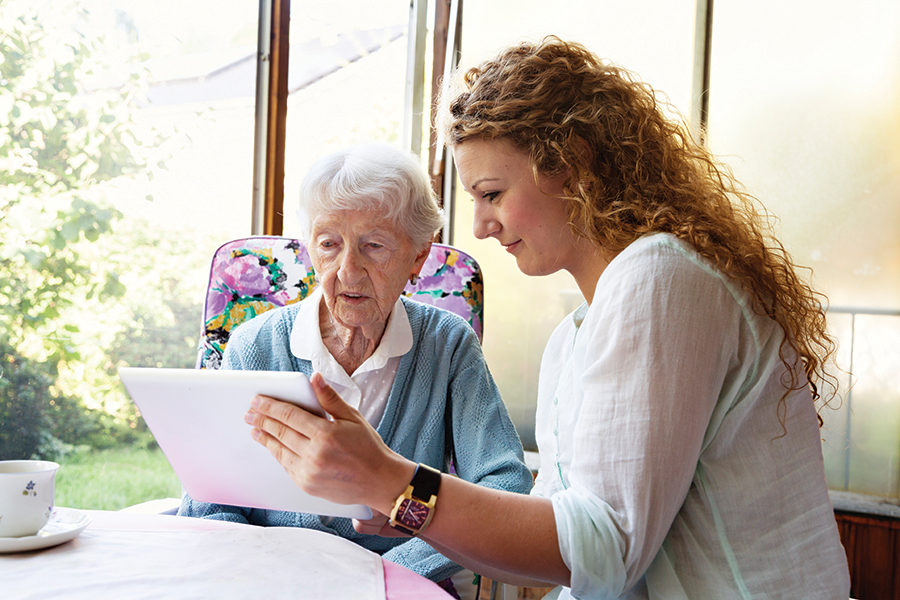
Home » Visiting Angels embraces tech to keep seniors safe at home
Visiting Angels embraces tech to keep seniors safe at home

June 12, 2020
A Kennewick in-home care company is deploying computer tablets and electronic assistants to help its elderly and disabled clients stay safe and connected during the coronavirus crisis.
Visiting Angels, led by owner and operator Christine Rose-VanWormer, equipped its caregivers with privacy-enabled tablets to take to clients’ homes to hold virtual visits with their physicians. The tablets are programmed to follow the federal Health Insurance Portability and Accountability Act, or HIPPA.
Visiting Angels also is offering Constant Contact, an in-home network of professional-grade Alexa voice-activated assistants that assure clients can summon help if they fall or have another emergency that requires assistance.
Rose-VanWormer deployed the technology to boost services as vulnerable clients hunker down to avoid exposure to coronavirus, which can lead to deadly complications for the elderly, disabled and others with underlying health conditions.
But it won’t disappear when the pandemic passes.
“We’ve been testing them out in the community. We’ve been having great feedback,” Rose-VanWormer said.
The tablets help clients keep in touch with their physicians, but the client isn’t expected to navigate on his or her own. Visiting Angels staff bring the gear to the client’s home and help them use the tablet during appointments.
“Our staff walks the client through the whole thing. We don’t just expect them to figure it out,” she said.
The caregiver can serve as an advocate during the appointment as well.
The devices are programmed with software to prevent eavesdropping, keep information private and deter hackers from entering private conversations.
When the session ends, the device is wiped clean so it can be used in other homes.
Constant Companion is a professional version of the Alexa device. The voice-activated devices are placed throughout the client’s home, including bathrooms where most falls occur. They’re preprogrammed with emergency information, as well as family and friends contacts.
If seniors fall, they can summon help even if they’re not wearing a traditional panic button device.
Rose-VanWormer and her family have lived in the Tri-Cities since 2005. She bought Visiting Angels after working for the prior owner when she retired.
For Rose-VanWormer, it was the perfect opportunity to allow her husband, a disabled military veteran, to stay home with the children.
Visiting Angels employs 120 caregivers and serves about 160 elderly, disabled and veteran clients with in-home personal care that allows them to live in their own homes rather than institutions.
Home care was considered essential, so it continued to operate under Washington’s Stay Home, Stay Health order in March, which sidelined “nonessential” operations to slow the spread of coronavirus.
“I’m grateful I still have my team employed,” she said.
Business dropped at first. Clients’ families canceled their caregivers to protect their loved ones from the threat. It has revived as families conclude it is safer for a home caregiver to visit their loved ones than to move them to a facility.
Family members typically hire Visiting Angels to help parents or other loved ones with daily living activities, such as bathing, dressing, housekeeping, meal preparation, transportation and taking medication.
It accepts payment through the Veterans Affairs and Community Based Services program, long-term care insurance and direct payments.
Local News
KEYWORDS june 2020





